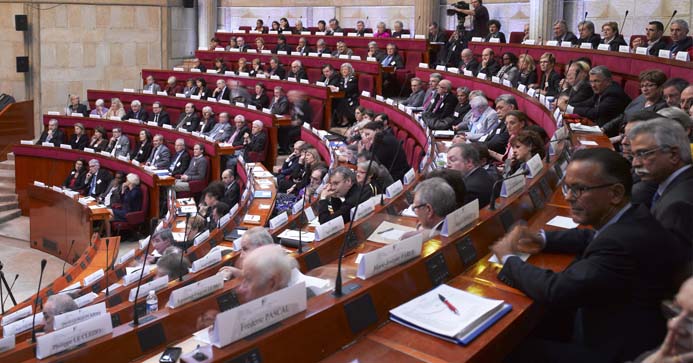- Home
- ABOUT THE ESEC
- ESEC overview
ESEC overview
Corps
The Economic, Social and Environmental Council (ESEC) is a constitutional consultative assembly. It represents key economic, social and environmental fields, promoting cooperation between different socio-professional interest groups and ensuring they are part of the process of shaping and reviewing public policy.

Mission statement
The ESEC broadened its field of expertise and the scope of its missions following France's constitutional reform in 2008 and the enactment of the organic law of 28 June 2010.
The Council's five main roles involve:
- Advising the government and parliament, and participating in the development of economic, social and environmental policies;
- Using its structure to promote dialogue between socio-professional groups with initially different concerns that combine to shape proposals in the public interest;
- Contributing to the review of public policy on economic, social and environmental issues;
- Promoting constructive dialogue and cooperation with consultative bodies created within local governments and with its counterparts in the EU and other countries;
- Helping inform citizens.
ESEC members
The ESEC has 233 members comprising 18 groups of representatives each appointed for a term of five years. Methods of appointing members are based on different rules amended by the organic law of 28 June 2010, which introduced changes to allow representatives for environmental and nature conservation to join the Council, along with representatives for youth and student interests.
The 233 members are divided as follows.
140 members for economic matters and social dialogue, including:
- 69 employee representatives;
- 27 representatives for private industry, trade and services;
- 20 representatives for farmers and agricultural activities;
- 10 representatives for craft industry;
- 4 representatives for liberal professions;
- 10 qualified individuals chosen for their experience in economics, including two from public corporations and one representative of French economic interests abroad.
60 members for social and territorial cohesion and community life, including:
- 8 representatives for the non-agricultural areas of the economy based on mutuality, cooperation and solidarity;
- 4 representatives for mutual organisations and agricultural production and processing cooperatives;
- 10 representatives for family associations;
- 8 representatives for other associations and foundations;
- 11 representatives for economic and social activities in French overseas departments and territories, including overseas communities and New Caledonia;
- 4 representatives for youth and students;
- 15 qualified individuals chosen for their experience in social, cultural, sports and scientific fields, in social housing, or in promoting the interests of disabled citizens and retirees.
33 members for environmental and nature conservation:
- 18 representatives of associations and foundations active in the field of environmental and nature conservation;
- 15 qualified individuals chosen for their expertise in sustainable development and the environment, including at least three business leaders from companies highly active in these fields.
List of Economic, Social and Environmental Council members
The French government may request that up to 72 public figures chosen based on their respective skills join one of the ESEC sections for a specific period and mission. These temporary members bring additional expertise to enhance the efforts of their respective working groups.
A given section may have no more than eight such temporary members, who will work alongside the other Council members on issues handled by the section. They may also vote on proposed studies and even act as rapporteurs. Unlike full ESEC members, they may not vote on draft opinions.
List of Economic, Social and Environmental Council temporary members